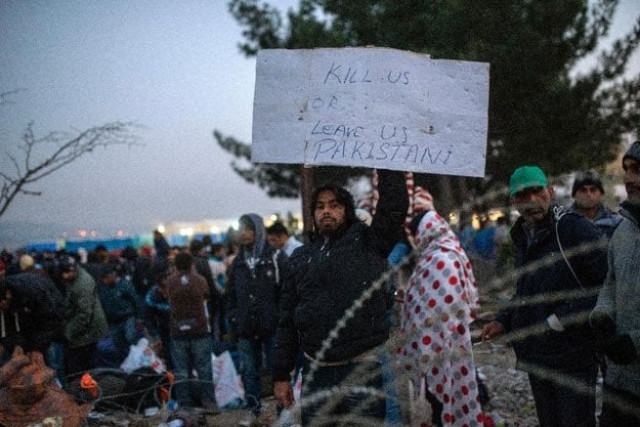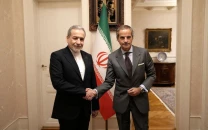Macedonia warns of 'security risk' over migrant bottleneck
More than 1,000 economic migrants, mainly from Iran, Pakistan and Bangladesh,were blocked at the border crossing

A migrant from Pakistan holds a placard as he waits with other migrants and refugees to cross the Greek-Macedonian border near Gevgelija on November 20, 2015 PHOTO: AFP
Macedonian President Gjorge Ivanov said the checkpoint at the country's Gevgelija crossing had "become a bottleneck for migrants and refugees" where "security risks are increasing".
Republican Ben Carson compares Syrian refugees to 'rabid dogs'
Ivanov said there was a "high risk" of incidents between refugees and economic migrants, as well as between migrants and police and the local population.
More than 1,000 so-called economic migrants -- mainly people from Iran, Pakistan and Bangladesh -- were blocked at the border crossing on Saturday.
Some carried banners calling for the border to be opened, while others read "We are sorry for France but we are not dangerous", after the French government said some of the suspects in last week's deadly attacks in Paris appeared to have used the migrant crisis to slip into the country unnoticed.
Hundreds of thousands of people fleeing conflict and poverty have travelled to Greece and up through the Balkans this year, aiming to start new lives in more prosperous northern European countries, with Germany the preferred destination for many.
'Syrians are not terrorists,' refugee tells America
But on Thursday countries along the migrant route began tightening restrictions by accepting only those fleeing war and violence in Syria, Iraq and Afghanistan.
On Friday migrants who found their passage blocked sat down on railway tracks, hampering trains between Greece and Macedonia.
Ivanov said the economic migrants stuck at the border were preventing around 3,000 refugees fleeing war and conflict from continuing their journey.


















COMMENTS
Comments are moderated and generally will be posted if they are on-topic and not abusive.
For more information, please see our Comments FAQ